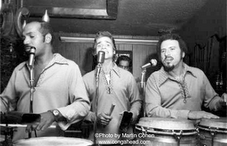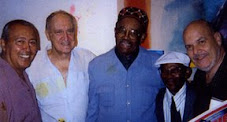
Among the ten top artistic directors and orchestral conductors is Daniel Barenboim, earning two million dollars a year, or should we say a season. In fact, these ten lucky individuals take in over ten million dollars in salaries! Not bad for a clique of sophisticated elitists in the symphonic and operatic establishments. Fundraising gala performances could use some housecleaning. Charity begins at home and should end in the street, where it will do the most good. To the people!
Are the complexities of Mahler’s Ninth Symphony any more challenging than a salsa montuno performed by Rene Lopez’s twelve-piece orchestra, where a close listener can catch experimental, classical, serial, modern and postmodern influences?
Music should serve to spread the maximum good the greatest audience. It should best be out of Lincoln Center’s grasp and out in the street for the people, by the people and of the people…a birthright. For every black tie fan attending the annual Mostly Mozart festival, a thousand Latinos are enjoying Marc Anthony’s latest hit.
A worldwide survey found Puerto Rico to be No. 1, the happiest place on earth. Is it because many poor families harbor at least one musician or more? More than an evening’s gala is present night and day in the Latin music that is in the air one breathes…out in the streets of P.R. It is not in the snooty confines of academic strongholds that are constantly begging for donations to stay alive while attendance dwindles. Is this not a good example of snobbism, where unknown names perform unknown opuses to a restricted, mostly tax-sheltered “select” audience?
When the average music teacher struggles to secure pupils that struggle to afford lessons themselves, this in itself restricts not only the appreciation of music but also its influence. Money should not only go into offering scholarships but also into making musical instruments available like library books to students who cannot afford to buy them, like giving them chances to learn how to fish, instead of giving a handout.
In an alley alongside a nightclub opposite El Capitolo in Havana once stood an old beat-up piano. It was placed there during the day and rolled out front at night where the Anacaona all-girl orchestra played on the sidewalk as people passed by. We could call it, today, a free concert. During the afternoon, anyone who wished to play that piano (while standing) could do so. Strangers would crowd around it and sing along as though they were fraternity boys joining in. They would continue singing as they left to continue their day. This is what music is really all about. It is our global anthem.


No comments:
Post a Comment